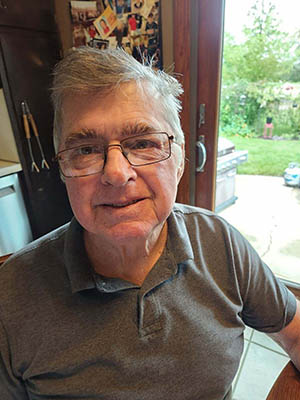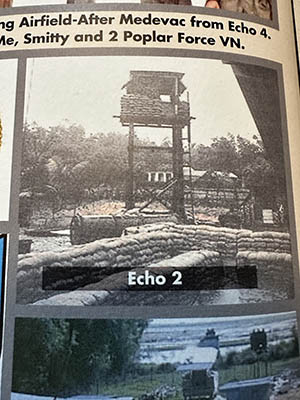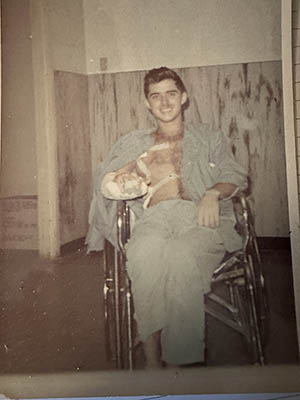Marines Vietnam War Harvey, IL Flight date: 10/18/23
By Frank Hauenschild, Honor Flight Chicago Veteran Interview Volunteer
Don Talbot spent his first years with parents, Walter and Helen, in their home on the southside of Chicago. Upon completing 7th grade at Madison Grade School, Walter and Helen, with Don and his siblings, Barb, Wally and Bobby, moved to their new home in Harvey, Illinois. Don was enrolled in the 8th grade class at Bryant Elementary School. Graduating from Bryant, he then attended Thornton Township High School, also in Harvey. “It was a great time to be a senior at Thornton in 1966. The basketball team won the State Championship Title, our football team had an undefeated winning streak, and the gymnastics team was very competitive, I was having a great time,” Don recalled.
By the end of 1966, Don’s High School graduating year, our country was deeply committed to the war in Vietnam. American service personnel reached 385,000 in country plus an additional 60,000 sailors stationed offshore. Knowing that he wanted to enlist, Don and his closest friend, Kenny Graber, went to the Navy Recruiter in Harvey to enlist in the “Buddy Program.” Upon meeting with the Navy recruiter, they were informed that the Buddy Program was not available for them as Kenny was only 17-years-old at that time. The recruiter offered Kenny the youth enlistment option where he could enlist at 17 and then report to basic training when he turned eighteen, with the months before turning eighteen counting towards his four-year commitment. As the Buddy Program was out for Don, as he was already 18, his option was to enlist for the full four years.
As Don was mulling his decision to enlist in the Navy, his attention was drawn to the Marine Recruiter who also was in the recruiter’s office. Curling his index finger to have Don come to him, Don recalled the Marine recruiter stating “I can get you out in two years if you join the Marine Corps.” Don asked the recruiter if he liked being a Marine after two years, could he continue being a Marine, which was answer by “you can stay a Marine for as long as you want to, two more years or fifty years!” Don was all in with the Marine Corps and signed up.
On October 3, 1966, Don began his boot camp in San Diego, California. Coming out of boot camp, it was on to Camp Pendleton for I.T.R. (Infantry Training Regiment) and then on to Basic Infantry School. Upon completing Basic Infantry School, and after a short leave, he was on a plane to South Vietnam. After a short three-day layover in Okinawa, it was on to Vietnam. “We had a few days in Okinawa, I believe that during that period of time, they were sorting out the duty assignments for us new guys once we got to Nam,” Don opined.
Arriving in Da Nang Air Base in February, 1967, the newbies deplaned and awaited their Orders. One by one, Don watched as troops were told to go to either that bus, or to that troop carrier for their assignments. Upon reaching Don, the officer said, “grab your duffle and report to that building, pointing across the airfield, you will be stationed here at the Da Nang Air Base.”
Da Nang Air Base was a major military base in Vietnam mostly occupied by Air Force and Marine personnel and equipment. “As a major air base facility, it was pretty secure and well protected, there wasn’t much action for us.” Being assigned to Delta Company, Don’s job was base and surrounding area security. “It was a good duty assignment as we would work a four-day cycle. We would run patrols in the little village known as Dog Patch, which was located between the air base and the P/X off base, and then be assigned to bunkers on the perimeter of the air base,” Don related. “During my time with base security, it was pretty uneventful, I spent most of my time in the bunker watching the fighter jets and helicopters take off and land.”
In July 1967, while he was on bunker duty, the VC commenced a full-scale rocket attack on Da Nang Air Base. Don related the attack was intense and consisted of rocket and mortar weapon barrage. The attack, Don recalled, was devastating to the air base. Buildings were destroyed as well as hangars, taxiways and runways were heavily damaged from the attack. Don recalled that besides keeping a close eye for ground movement, he was able to witness the air attack as rockets soared over his bunker.
Though the major attack was on the air base, a few rockets/mortars struck near Don’s bunker. Don was outside when one blast occurred near him, and he jumped into a different nearby bunker. Unbeknownst to Don, the bunker was already occupied by an Air Force Airman with his security dog. Startled by the newcomer, the dog attacked Don and bit him in his leg above his boot. The Airman, finally realizing that Don was not “Charlie,” pulled his dog off of Don’s leg. Soon after the rockets silenced, Don realized his dog bite was more than superficial. The corpsman looked at his leg and said he would need stiches. At the base hospital, a doctor cleaned and stitched up the dog bite. Finishing up, the Doctor related that Don would be eligible for a Purple Heart for the dog bite. Don recalled shaking his head and promptly refusing the offer thinking “I am not accepting a Purple Heart for a dog bite, especially for an injury by an American dog!”
During his tour at Da Nang, Don volunteered for an assignment with the Combined Action Program. (CAP) The CAP program consisted of 12-15 Marines, augmented by a corpsman, which was then strengthened by surrounding Vietnamese militia known as “Popular Forces.” (PF) Don explained that the Popular Forces consisted of residents of hamlets that were either too old or too young be in the Army of the Republic of Vietnam. (ARVN) Don also believed that many of them were either “rejected or removed from ARVN” before joining the CAP Program. The CAP program was interesting to Don. “We learned the language, learned some new tactics, and it wasn’t sitting in a bunker or going on patrols endlessly.”
Don remembered that while in CAP training, they were called into action when an established CAP was overrun in the field. His unit was sent from CAP school on a troop carrier with the PFs to an area about two hours away from Da Nang Air base. Disembarking from the truck, his unit trekked their way to the overrun CAP barracks, “It was a little scary as we advanced and I was on full alert waiting for enemy engagement,” Don recalled. He related that they finally reached the CAP post, but all was quiet by the time they arrived. His unit stayed a week or so before returning to base to complete his CAP training.



Upon completion of CAP training, he was assigned to Fox Trot 7. Fox Trot 7 was set up outside the perimeter at seven locations around the air base. “We were transported to my location by a troop truck, but it would have been walkable if necessary.” As Don was located on a river peninsula, he reflected that their purpose was to be an “early warning system’ for an enemy ground attack on the air base. “Life was good there, we cycled units every week, we had hooches, a bar and even a hut for the corpsman who often treated the nearby villagers. We played football, went swimming, and ate and drank beer when we were not on patrol or on perimeter duty!” Don related that they could order food that would be brought to them along with other provisions from the air base. A “hot meal” consisting of steak and sides was always welcomed while on duty. Don recalled that eventually Foxtrot units were renamed as ECHO Units with his being ECHO 2.
As time lulled by, relatively quiet for Don but for an occasional attack at ECHO 2, things dramatically changed on January 30, 1968. As part of the Tet Offensive, ECHO 2 was hit by an enemy attack. NVA was across the river from ECHO 2 and began firing and deploying troops across the river. The battle intensifying, air support was called in to assist in turning away the enemy. “The air support was almost immediate after our call; attack helicopters and propeller gunships blew the heck out of our peninsula!” Don expected fighter jets, but then realized that they were not too far from the air base and jets would have to take off and then circle back to be effective. “They kept us in good shape out there” as Don realized that a “war” was coming to his neck of the woods.
A few days later, ECHO 2 was summoned for volunteers to go out in the field to support ECHO 4 who was undergoing a major attack. Volunteers from ECHO 2, including Don, and from ECHO 3 were transported on Highway One and across the Cam Le Bridge in the early morning hours of February 8, 1968. Don knew ECHO 4 was across the river and located in an extremely dangerous place near the enemy lines. Dismounting the trucks, the unit consisting of 12 Marines and 12 or so Popular Forces re-grouped and began their walk to EHCO 4, about a mile or so from Highway One. Traversing the rice paddies, they tried to stay close or in the irrigation ditches as they were mostly dry and offered protection in the event enemy shooting started. When a ditch was blocked or water filled, they would exit the ditch and circumvent the blockage. All was going well until they neared the tree line at the edge of the rice paddy.
Suddenly “all hell broke out as enemy fire commenced” Don recalled. Stating that they were hitting them hard, Don took note that many of his fellow Marines were going down during the firefight in short notice. Returning fire, Don felt a sharp pain in his right shoulder and knew he was hit. “It must have been adrenaline, but I just kept on firing” Don stated. Don was then shot a second time in the left shoulder, but he continued the firefight. A third bullet then struck Don in his right lower abdominal quadrant. “That burning pain was immediate and I knew I was seriously wounded.” Despite being struck a third time, he noticed a VC with a hand grenade that was going to be thrown in his direction. Don raising his rifle and firing, he saw the VC soldier go down, but it was too late, the grenade landed and exploded.
When Don regained consciousness from the explosion, he realized that his hands were behind his back and were being tied together. Screaming expletives to his captor, his head was forcibly raised and then thrusted back into the ground. While his head was raised, he could see his fellow Marines who had been killed, and like him, all of their equipment was stripped from their bodies. “They even took my boots,” Don recalled. “I was captured and the only thing I realized was that either I would be killed where I laid, or I would be spending the rest of the war in a POW camp.”
Later another VC grabbed Don by his hair and raised his head up off the ground. Don, seeing no alternative, took a few quick breaths and a long breath out and let his body go limp. “I was going to try to feign my death, “ Don stated. The trickery worked; the VC soldier bought into the ploy. “It wasn’t immediately though; he jammed his rifle butt into my back and kicked in the side where I was shot. I could not move, I just held my breath, and took the pain.”
As the day wore on, Don laid there motionless. He could hear the constant voices and footsteps and rounds being fired as the VC advanced. A few more VC came across him during the day and gave him a few kicks or rifle butt hits, but he remained motionless with shallow breaths.
Later that afternoon, he heard whizzing overhead. Then explosions were occurring around him as he realized it was friendly artillery fire from American forces. Whatever VC and NVA were left in his area, quickly scattered. “The fire was so close, I felt a heavy weight on my back, it turned out to be a mound of dirt being flung in the air from the artillery fire,” Don recalled.
As dusk approached, Don, not hearing any movement or voices, decided to make his move. Being able to twist his hands, he was able to undo the ties that held his hands together. He attempted to stand up but immediately fell. A second try was attempted with the same result. Don’s only recourse was to crawl the way they came in earlier that day. Hitting a ditch with water, he had to hydrate. “It was disgusting as I pushed away bugs and scum on the water surface as I took a drink, it was refreshing.” Retracing his way through the ditches in the rice paddies, he finally made it to Highway One at sunrise. He heard a vehicle and tried to stand but he fell again. As he then raised his arm for attention, he was noticed. He heard Vietnamese voices, thinking they either could be enemy who overtook the Highway or friendly ARVNs, he could go no further.
A voice called out to him “Hey Marine, where is rifle, a VC souvenir?” Not seeing the humor in the comment, Don avoided a verbal response, “as my look towards him was condescending. The ARVN Officer ordered first aid for Don which included a couple of injections in his buttocks. “I don’t know what the shots were, but it helped the pain almost immediately.” Eventually, an Army Major with supporting vehicles arrived. When asked by the Major which jeep he would like to be transported to the base hospital, Don stated he would like the one with the “Red Cross” and then asked his driver to please take the smooth roads to the hospital.
Being attended to at the Da Nang base hospital, he underwent emergency treatment which included wound care for his gunshots and for the shrapnel wounds to his head, arms and hands, in addition to exploratory surgery for his abdominal wound. Waking up all bandaged, he learned that his abdominal wound, though missing vital organs, did strike his ilium bone. His doctor explained to Don that the shattering of the ilium bone prevented him from standing up and walking. Don was confined to his bed at Da Nang for approximately thirty days. Don was then informed by his doctors that they could not do anything more for him at Da Nang and he needed further surgery to rebuild his ilium bone.
Don was then flown to Japan to an Army Hospital where surgeons completed his ilium repair. “I barely was off the plane when I was whisked off to the hospital and into surgery,” Don stated. Recovery in Japan was for two weeks, and then regaining his mobility again, it was back on a plane to the States for Don. Landing on Leap Year Day, 1968 in California, Don was placed on another plane to O’Hare and then transported to Great Lakes Naval Hospital. It was a relief for Don to be so close to his hometown of Harvey, “I had tons of visitors as they all came in groups in a single vehicle” Don chuckled.
Don recovered for five months at Great Lakes and was offered to stay at Great Lakes until he became a “short timer” and eligible for discharge. Don, still being a Marine, wanted to be stationed at a Marine base. “I wanted the experience, the only Marine base I was at was for boot and infantry training, I elected to be stationed at Quantico.” After a few months of Marine base life, Don decided to just complete his commitment and return to private life. Don was honorably discharged in October, 1968, at 20 years of age. Returning to Chicago O’Hare and hooking up with a Marine he went through training with on the plane, they decided to stop and have a cocktail at the airport with a few other returning veterans. Being carded, Don was asked to leave the bar as being underage, “I just shook my head thinking ‘unbelievable’ and waited outside the airport bar,” Don related, still shaking his head.
Don returned home to Harvey and took a job at Andrew Corporation in Orland Park, IL. Not being his cup of tea, Don entered the insurance sales industry and retired in 2020 after a 30-year career. Also, during this time, he met his future wife, Diane, in 1972 and they were married in 1977. They both enjoy retirement after raising a family of four, namely Eric, Kevin, Dana, and Craig, who they remain as a close-knit family.
Thank you Lance Corporal Donald D. Talbot, U.S. Marine Corps, for your dedicated service to our country. Enjoy your well-deserved Honor Flight with your fellow veterans!


